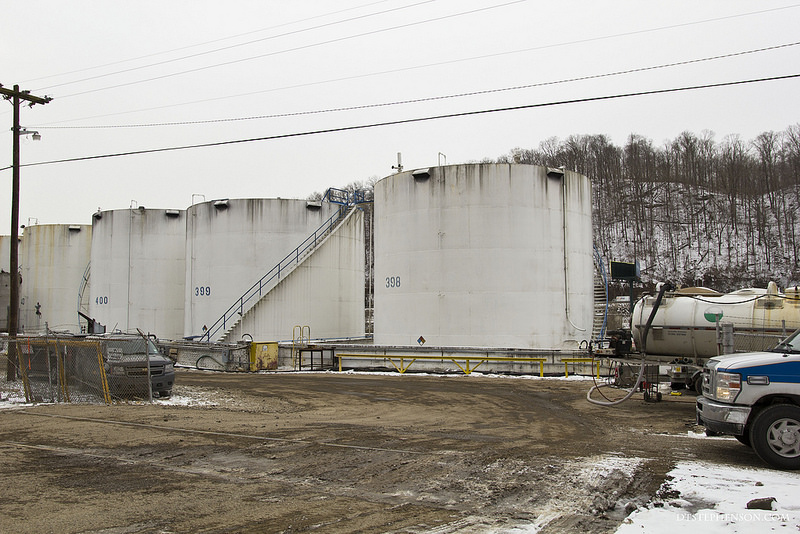My parents live only a couple miles upstream of the site of last month’s West Virginia chemical spill. Like many other local residents, they continue to drink bottled water amid ongoing confusion and uncertainty about the safety of the area’s water supply. Some people in the region have even resorted to melting snow to bathe their kids.
On January 9, Freedom Industries leaked massive quantities of the toxic chemical, 4-methylcyclohexanemethanol (MCHM), into the Elk River, a tributary of the Kanawha River and the largest inland waterway in West Virginia. The chemical spill fouled the water supply for 16 percent of the state’s population.

Etowah River Terminal, Freedom Industries, site of January 9 chemical spill
Photo credit: flickr/D.T. Stephenson
Sadly, this is just the most recent example of water pollution in the state. Growing up in West Virginia, I remember going to a swimming hole up in the mountains while I was in college. By the end of the day, my fingernails were stained orange from what was almost certainly acid mine drainage. West Virginians have dealt with the harmful byproducts of the coal industry for generations.
And the spills, leaks, and bursts just keep coming. On Tuesday a pipe burst, spilling toxic coal slurry waste into another tributary of the Kanawha River, just east of Charleston. Smaller spills like this happen frequently in the region, and this incident wouldn’t be making national news if it weren’t for the earlier chemical spill.
Accountability? Anyone?
I wonder: will anyone ultimately be held accountable for the damages caused by the chemical spill? The company responsible declared bankruptcy days after the accident and this week even skipped a Congressional field hearing investigating the incident. What if this disaster happened in the Hudson Valley? Surely there would be public outcries to hold someone responsible, and I bet at least a few political careers would have ended. Why should the Kanawha Valley be any different?
Unfortunately, these types of incidents are common in West Virginia, where industry lobbyists work hard to weaken regulations and fight enforcement. Communities seem to accept that accidents happen and there isn’t much they can do about it – and that’s just not the case. The chemical spill started a new conversation about industry accountability. Even as the industry provides jobs and supports economic activity, it should still be held accountable for its actions.
The unaffordable truth
As the brother, son, and grandson of West Virginia coal miners, I understand what coal means to our state. It’s a source of great pride to our family and to many families in West Virginia, and with good reason: we’ve kept the nation’s lights on for generations.
But as a scientist, I must say it’s time for all of us, including the coal industry, to acknowledge that the life-cycle of coal production and use causes great damage to public health and the environment.
Coal causes damages and risks at every stage of its production and use. As coal is mined, cleaned, processed, shipped, and burned, it threatens our air, water, climate, and communities.
The cold, hard truth is that coal is not cheap. Quite the contrary.
Many of these damages are considered “externalities,” meaning they aren’t factored into the costs of coal-fired electricity. Conservative estimates suggest that if we try to include these costs, the price of coal-fired electricity would easily double or triple.
Let’s take the Elk River chemical spill as an example. Yes, the spill came from a chemical facility, not a coal facility. However, this particular chemical is used to clean the coal before it is shipped. Its use in the processing of coal as a fuel makes it one of those pesky externalities that fall outside of the calculations used to determine our electricity rates.
Since the cost of electricity doesn’t account for damages, who pays to clean up the mess? Taxpayers. The federal government provided disaster aid to the nine effected counties, and the state legislature appropriated emergency funds to support small businesses. While we must think about the people who consumed the tainted water, there are a number of other losses to consider. What about the restaurant owners and workers who lost wages when their establishments closed in the immediate aftermath of the spill? And those are just some of the costs that we can actually measure. How do we measure the public’s lack of trust in the safety of the water systems moving forward?
West Virginians want clean water just like everyone else. Our public polling from last June shows that residents overwhelming support enforcement of the Clean Water Act from coal mining activities. This is true even in the heavily mined areas of the state.
Right now, all our eggs are in the coal basket — and this is a risky move. We must begin to diversify the economy, creating new and additional opportunities to allow people to live, work, and thrive in the places they call home. West Virginia has an enormous number of assets in addition to its natural resources: the natural beauty, recreational and outdoor activities, potential for energy efficiency and renewable energy development, rail infrastructure, advanced manufacturing, and most of all, its top-notch work force.
As our nation and the world begin to move away from coal and other fossil fuels in response to the very real threat of climate change, it’s critical that we diversify our local economies, so that coal miners, their families, and their communities are part of that transition to a clean energy future.
This post originally appeared as a guest blog on MSNBC.
